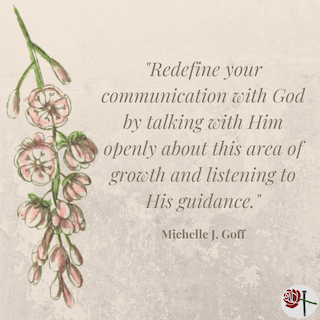Blog Article Tags
We love building relationships. Subscribe to our blog to receive weekly encouragement in your email inbox.
Search Blog Posts
- Details
 Written by Michelle J. Goff
Written by Michelle J. Goff
“May the words of my mouth and the meditation of my heart be pleasing in your sight…” (Ps. 19:14) “Out of the abundance of the heart, the mouth speaks…” (Luke 6:45)
Scripture is filled with instructions about our speech, as well as the importance of listening to God first, and then to others (James 1:19).
James, the New Testament “Proverbs,” dedicates about a fourth of his 5-chapter book to the tongue. The book of Proverbs includes more than 130 warnings about the tongue, our words, and other similar admonitions about communication—the speaking and the listening. These two books are not the only ones with instructions about how our communication should be redefined by God and His wisdom.
“Whoever keeps his mouth and his tongue keeps himself out of trouble” (Prov. 21:23).
“For we all stumble in many ways. And if anyone does not stumble in what he says, he is a perfect man, able also to bridle his whole body” (James 3:2).
Our words matter. They have an impact. “Sticks and stones may break my bones, but words will never hurt me.” Wrong! Words can build up or tear down, bless or curse. Both Solomon and James contrast the blessings and the curses that can come from what we say to others. They also both highlight the importance of seeking wisdom in our speech, attitudes, and actions. God promises that if we ask for wisdom, He will provide it (James 1:5).
We all readily accept the conceptual need for wisdom in our communication, both the listening and the speaking. However, we listen with our own filters in place. We make assumptions. We speak with the urgency of ensuring that our message is well-received and understood. How can we redefine our communication so that it is in line with the Spirit?
Top Three New Testament Suggestions for Redefining our Communication:
• “Let your speech always be gracious, seasoned with salt, so that you may know how you ought to answer each person” (Col. 4:6)
• “Do not let any unwholesome talk come out of your mouths, but only what is helpful for building others up according to their needs, that it may benefit those who listen” (Eph. 4:29).
• “Everyone should be quick to listen, slow to speak and slow to become angry” (James 1:19).
Common Threads:
How do you want to grow and bloom in your redefined communication—more in the listening or the speaking? Please be specific and don’t forget to share it with an Iron Rose Sister so that you can pray together.
Are there any barriers to communication that you know exist between you and another person? They may be thorns hindering the redefined communication.
One specific area in which you can dig deeper in redefined communication is to reflect on those with whom you communicate well. What’s different about that relationship compared with those with whom you don’t communicate well?
As you answer these questions, it can be easy to get defensive. I encourage you to bathe this topic in prayer. Redefine your communication with God by talking with Him openly about this area of growth and listening to His guidance.
- Details
 Written by Kristi Bond, volunteer with Iron Rose Sister Ministries in Arkansas
Written by Kristi Bond, volunteer with Iron Rose Sister Ministries in Arkansas
How often do we do something without thinking it through first? The answer should be…constantly. In fact, God created our brain to direct various functions of the body without our having to think about them or be completely conscious of them. The actions and reactions of the nervous system, digestion and respiration, for example, do not need our attention.
One of the greatest problems that human beings have is that we often speak or have conversations as if our capacity to speak were merely one of these unconscious acts. We speak without meaning to. We don’t guard our tongue when we should. Or we let moments pass when we should have spoken the truth because we are not aware.
When God created the universe, light, land, animals – and humans – He did it with words. “And God said, ‘Let there be light,’ and there was light…God called the light ‘day,’ and the darkness he called ‘night’…” (Gen. 1:3-5, NIV). In the first chapter of her book Speak Love: Making Your Words Matter, Annie F. Downs writes that God could have created the world by coughing or with His hands or His thoughts, but He didn’t do it that way. More than half of the verses in Genesis 1 record God’s words - communication was integral to creation.
More than this, our Creator formed us in His image (Gen. 1:26-27), giving us also the capacity to communicate – and not only to communicate, but to create with our words. What is it that, at least in part, creates a friendship? A marriage? An idea put into practice, or a new business? Words! Communication gives life to desires and thoughts. We have the capacity to create because God gave us the gift of the spoken word.
In the first communication from Adam of which the Bible informs us, he himself gives names to the animals, in the same way that God named the day and the night: “…whatever the man called each living creature, that was its name” (Gen. 2:19b, NIV). Names are important, as are the words that we use to describe something. Our words contribute to forming perceptions of everything around us and even of what we think of ourselves. Most importantly, our words can impact the self-perceptions of others. Communication redefined recognizes the power of creation that exists in our words.
We are reminded of this power in Proverbs: “The soothing tongue is a tree of life, but a perverse tongue crushes the spirit” (15:4, NIV), and also “The tongue has the power of life and death, and those who love it will eat its fruit” (18:21, NIV).
If the power of life and death resides in our words, shouldn’t we consider them carefully? How is it that we can treat so casually this incredible gift that God has given us? When we put down another woman, when we disparage our husband or criticize our children without thinking, we sow thorns instead of planting a tree of life. We must give thought to the fruits that our words produce in the lives of others.
How can you use your words today to create life?
